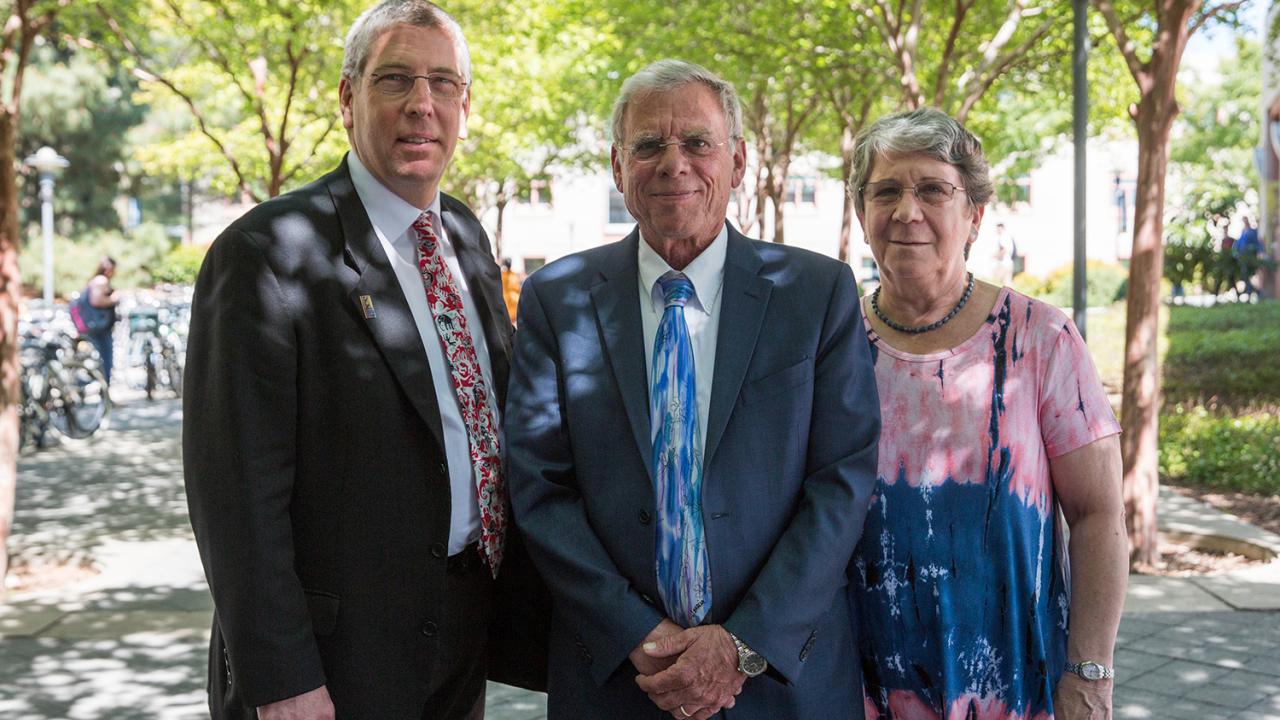
John Cuppoletti, ’74 B.S. and ’77 Ph.D. in Biochemistry, Professor Emeritus at the University of Cincinnati
John Cuppoletti graduated in 1974 with a B.S. in Biochemistry, becoming the first in his family to earn a college degree. He then completed a Ph.D. in Biochemistry in 1977.
Cuppoletti is a professor emeritus of molecular and cellular physiology at the University of Cincinnati in Ohio. After recently publishing his last manuscript and closing his research lab, Cuppoletti has shifted his focus to a new role. He now serves as the volunteer director of University of Cincinnati’s internal grant program, which coordinates and distributes funding to students and faculty.
His scientific career has centered on cellular transport proteins and processes of the gastrointestinal tract. At the time Cuppoletti began his work, very little was known about how small molecules were transported across cell membranes, which separates the cell interior from the outside environment. His research has addressed the role of chloride transport channels, which are now understood to control the movement of salt and water in and out of the body’s cells.
Disruptions in these channels can lead to damage in the lungs and digestive system and serious health conditions such as cystic fibrosis. Cuppoletti has worked to develop procedures and medications to help facilitate ion transport among the body’s cells. To this end, he has received a number of grants from the National Institutes of Health, Cystic Fibrosis Foundation, Department of Defense and in private industry. Cuppoletti has published approximately 100 research papers and holds 13 patents.
Discovering a passion for research
In 1972, Cuppoletti came to UC Davis as a junior year transfer student from Santa Rosa Junior College of Santa Rosa, Calif. In need of employment to help support his education, he combed campus, searching for a job. By chance, there was an opening in the laboratory of (now, Emeritus) Professor of Biochemistry and Biophysics Irwin H. Segel, and Cuppoletti soon began work in his first research lab.
Under Segel’s guidance, Cuppoletti began studying sulfate uptake in fungi, a process which produces penicillin. He immersed himself in Segel’s work, growing his understanding by questioning postdoctoral fellows in the lab. Cuppoletti quickly formed his own hypotheses and started conducting research.
“I learned to express models for transport processes mathematically, using the equations to make predictions about the behavior of each model,” said Cuppoletti. “It was a natural fit for me since I liked working with my hands and was fairly good at the type of math required for the modeling. Writing up the work was a joint effort, and publication was a natural outcome.”
By the end of his junior year, Cuppoletti had his first paper published. He was first author on two more publications by the time he received his Ph.D.
“All of my research came from asking a simple question, how does something get from one side of the cell membrane to another?” Cuppoletti said. “That simple question started me on a lifetime of research. And of course, answering one question always led me to another. I realized that the real joy was in trying to answer the questions.”
Cuppoletti recognizes the importance of the scientific method in addressing the challenges of our world. He encourages each individual to find an appreciation for it, as it helps with critical problem-solving skill in all areas of life.
“Everyone exposed to the scientific method can be critical thinkers,” Cuppoletti said.
Paying it forward for first-generation students
As a first-generation student, Cuppoletti values the opportunities that others provided to enable him to find his place in the world.
“I succeeded in life because of many people who helped me along the way,” he said. “I remember this and try to emulate their behavior, particularly toward students. I have always tried to repay them in whatever way I could.”
For fifteen years, Cuppoletti also served as a volunteer firefighter in his community. From these experiences, he learned about leadership and teamwork, skills he continues to carry with him in life.
With his wife and University of Cincinnati colleague, Danuta H. Malinowska, professor emerita of molecular and cellular physiology, the two established the Santa Rosa Junior College Cuppoletti Malinowska Chemistry Scholarship and the Cuppoletti Malinowska Chemistry Program Award.
They also support the University of Cincinnati’s Gen-1 Theme House, the nation’s first living and learning community focused specifically on first-generation college students. With a goal of increasing freshmen year completion rates, the living and learning community provides resources for student success.
“My advice to first-generation students is to be curious and act on your curiosity,” Cuppoletti said. “Find an environment that will allow you to learn first-hand about the work that interests you.”
Last July, Cuppoletti and Malinowska established the John Cuppoletti and Danuta H. Malinowska Award in Biochemistry and Molecular Biology. This award supports first-generation undergraduate transfer students with declared majors in the Department of Molecular and Cellular Biology, from underrepresented populations who demonstrate financial need.
“It is our wish to promote the academic enrichment of first-generation students, providing them the opportunity to carry out research projects in the laboratories of mentors, travel to research meetings and participate in career experiences,” the two said. “All of these opportunities will better prepare students for their professional pathways.”
